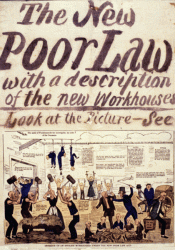Warren's Blacking Factory

Situated in 30 Hungerford Stairs, just off the Strand in London, Warren's Blacking Factory was one of the many unethical factories during the Victorian period in England which exploited young children for extremely low wages and cruel conditions. During the Victorian era, it was not uncommon for children of the working class to work for 16 hours a day in factories with their families. For example, Charles Dickens, the influential writer of the Victorian era, was employed under Warren's Blacking Factory at the age of 12 where he labeled jars of boot polish. Dickens himself has been vocal about the haunting expreience of working under this factory, which is reflected in his writing. In fact, A Christmas Carol was written due to Dickens' distaste towards the living conditions of poverty, especially when it came to child poverty. Therefore, Dickens' novella becomes an explicit argument againt the British social attitudes of the 19th century.
Copyright: Public Domain
Principle sources:
http://www.victorianweb.org/history/hist8.html
http://thecircumlocutionoffice.com/trail/london/warrens-blacking-factory/

